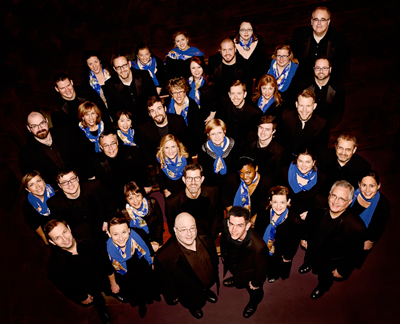by Daniel Hathaway

Thus CCC’s season’s opener at First Baptist Church in Shaker Heights on Saturday, October 22 at 7:30 pm will be repeated at John Knox Presbyterian Church in North Olmsted on Friday, October 28 at 8:00 pm.
MacPherson’s second idea is more topical and feeds directly into the repertoire for the ensemble’s fall concerts. “As early as last spring I was thinking about a program of American composers and genres, since it was going to be election season. Though it’s not going to be a flag-waving, patriotic program, it reflects the fact that one of the most important things we do as adults is to elect a new head of our government.”
In keeping with that sense of serious business, MacPherson will begin with two works by colonial-period composer William Billings, the first of them very solemn indeed: When Jesus Wept, followed by his Christmas carol Shiloh.
The Billings will be followed by a piece written in 1890 by that American original, Charles Ives. Psalm 67 is a bitonal work where the women’s parts are in the key of C Major, the men’s in g minor. “Ives was way ahead of his time,” MacPherson said. “Unlike professional composers, he wasn’t bound by commissions or by having to make money, so he did what he wanted.”
The spirit of restrained solemnity MacPherson is out to create is perfectly represented by Randall Thompson’s famous Alleluia. The composer wrote it in 1940 at the behest of Serge Koussevitzky for the opening of the Berkshire Music Center at Tanglewood, specifying that it had to be sight-readable by an assembly of international musicians. Thus Thompson planned a piece that set only two words of text — “Alleluia” and “Amen” — and while he was writing it, the Nazis invaded France. He described the work as “a sad fanfare” marking that occasion.
“One of our singers who performed the Alleluia under Thompson reported that he always took it at a much slower tempo than anyone else,” MacPherson said. “We’ll do that in our performances. It makes things more difficult, but it gives the piece a very different feel — it’s almost like experiencing the work for the first time.”
Admitting that he’s strongly drawn to American music of the World War II era, Scott MacPherson has also chosen to perform Aaron Copland’s Lark! and Samuel Barber’s Reincarnations. He said that Copland’s setting of Genevieve Taggard’s poem, with its references to rising from the “great dark,” is the most politically-oriented work on the program.
Then for something completely different, MacPherson will turn to the speaking quartet from John Cage’s Living Room Music. “People may wonder whether this is music at all,” he said, “but Cage was an American pioneer in all things non-traditional.”
Lamenting at having to choose from so many possibilities, MacPherson has culled his list of American folk hymns, folk songs, and spirituals to a workable selection for the second half of the program.
“We’ll be singing two Stephen Foster songs: Mark Teller’s arrangement of Hard Times Come Again No More and Jack Halloran’s arrangement of Nelly Bly. We’ll follow those with Cleveland-area composer Kevin Foster’s arrangement of the Shaker Tune More Love. Kevin said this was inspired by an election season when we need more love and less hatred in society.”
After Stephen Paulus’s The Road Home, MacPherson will lead his singers in spirituals arranged by Moses Hogan: There’s a Man Goin’ Round and Walk Together, Children. “The first is about death taking away ‘my mother, my father, my daughter.’ The second is a peppy, get-the-audience-to-their-feet closer. There are all the old spirituals by William Dawson and Jester Hairston, but Moses just took off creating his own new style of spirituals combined with gospel. They’re not easy!”
The conductor hinted that he has an “amazing” encore waiting in the wings, “should the audience request it.” Be advised.
What’s next for Cleveland Chamber Choir? MacPherson is planning Mothers Day concerts in May. “Take your mother out for lunch and then bring her to a wonderful concert,” he said, trying out an engaging marketing slogan. J.S. Bach’s Jesu, meine Freude and Benjamin Britten’s Flower Songs are on the short list for that program.
Published on ClevelandClassical.com October 18, 2016.
Click here for a printable copy of this article


